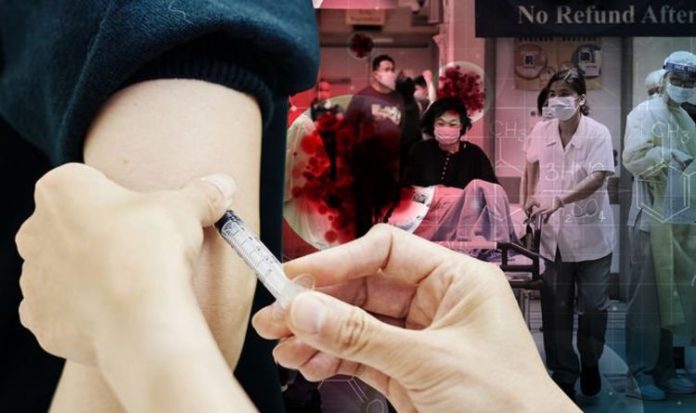The UK currently has the highest death toll figure across Europe after surpassing 40,000 and new cases of the novel virus continue to rise, sparking fears of a second outbreak. But a breakthrough could be on its way.
At least 176 hospitals across the country will be taking part in the new recovery trial by the University of Oxford, who were responsible for discovering the steroid dexamethasone can help save lives.
Now, they will recruit patients to test a new anti-viral antibody cocktail developed by Regeneron, an American biotechnology company.
The research will involve laboratory-grown versions of the antibodies patients, who have tested positive, usually develop to fight against the infection naturally.
These attach to virus particles and prevent them from infecting human cells.

COVID antibody cocktail rolled out to hospitals (Image: Getty)

Coronavirus cases on the rise across the UK (Image: PA)
This research marks the first time a recovery project has tested a new treatment developed specifically to tackle the coronavirus pandemic.
In previous attempts, pre-existing drugs such as the anti-malaria medicine hydroxychloroquine was ineffective.
The new antibody trial will involve 4,000 patents who will be split into groups; one will receive the standard care while the other will get the standard care plus the antibodies.
Martin Landray, professor of medicine and epidemiology at Oxford, told The Times: “We have seen the power of randomised trials to prove rigorous assessment of potential treatments.
READ MORE: Labour MOCKED as Sir Keir Starmer still trailing Boris in polls

Coronavirus patients to get antibody cocktail (Image: Getty)
“Up to now, we have largely been studying whether existing drugs can be re-purposed to tackle this new disease, bit we now have the opportunity to rigorously assess the impact of a drug specifically designed to target this coronavirus.
“There are good reasons to be excited about this new development – Recovery will provide a robust assessment of the effect of this lab-manufactured monoclonal antibody combination treatment in hospitalised patients.”
Following testing on monkeys and humans, the new treatment – called REGN-COV2 – had reduced the amount of virus and associated damage in the lungs.
Two types of antibodies are used in the treatment as they were found to latch onto the spike protein of the virus, used to infect human cells.
DON’T MISS
My right to life trumps yours to go to the pub, says STEPHEN POLLARD [COMMENT]
Matt Hancock shames Labour’s Ashworth with exact COVID testing figures [INSIGHT]
Sturgeon scores own goal as she admits she cannot solve COVID issue [REVEAL]

UK coronavirus cases mapped (Image: Express)
It should then stop the pathogen from infecting new tissue.
Chief investigator of the trial Peter Horby, professor of emerging infectious diseases and global health at Oxford, added: “We have already discovered that one treatment, dexamethasone, benefits COVID-19 patients, but the death rate remains too high so we must keep searching for others.
“The Recovery trial was specifically designed so that when promising investigation drugs such as REGN-COV2 became available they could be tested quickly.”
Nick Cammack, COVID-19 therapeutics accelerator at Wellcome, urged for any successful treatment to be made available globally.

Coronavirus cases around the world (Image: Express)
He said: “Novel antivirals and monoclonal antibodies are among the most exciting treatments for COVID-19 because they are specific to the disease.
“Large-scale randomised controlled studies like recovery give us the best understanding of whether drugs like REGN-COV2 are safe and effective against COVID-19, but we must ensure that any successful treatment is available to everyone who needs it globally.”
Since cases of the deadly virus were first reported in Wuhan, China, last year, the pandemic has spread around the world.

Coronavirus antibody cocktail rolled out (Image: Getty)
More than 29,000,000 people have been infected with the virus and 930,902 people have died.
The US has the highest number of total cases and deaths on a global level, with India and Brazil in second and third place respectively.
European countries have also seen a rise in cases of recent weeks with the likes of France and Spain being forced to impose restrictions again.







